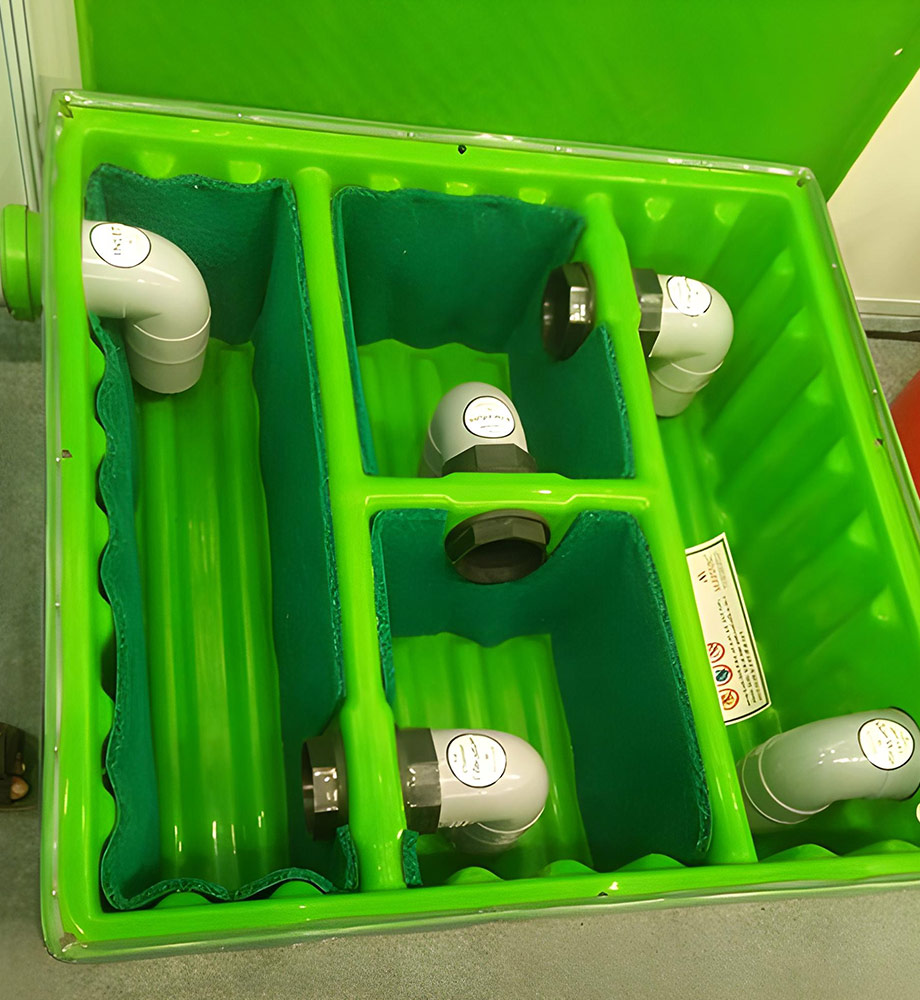Key Features
- Gas-Tight FRP Construction: Entire tank and cover made of corrosion-resistant FRP laminate (polyester or vinylester resin) that contains biogas safely.
- Corrosion Resistance: Resins are selected to withstand hydrogen sulfide, organic acids, and microbial byproducts typical in anaerobic digestion.
- Structural Stability: High glass-fiber content (often pultruded panels or filament-wound shells) provides the required structural integrity for full tanks and gas pressure.
- Custom Shapes and Sizes: Available as round or egg-shaped (ovoid) for gravity mixing; sizes range from a few cubic meters to multi-million-liter industrial units.
- Integrated Accessories: Options include agitator mounts, manways, gas collection headers, safety vents, and observation ports.
Benefits
- Odor and Gas Containment: Leak-free FRP prevents escape of odorous gases, improving plant hygiene and worker safety.
- Longevity: Superior resistance to sulfate attacks and biogenic corrosion, meaning decades-long service life vs. 10–15 years for unlined concrete.
- Low Overall Cost: Reduced maintenance (no concrete repair, no recoating) and lighter foundations offset initial cost.
- Thermal Efficiency: FRP’s low thermal conductivity can help retain digestion heat in cold climates (or allow easy insulation).
- Fast Installation: Prefabricated sections or one-piece tanks minimize on-site construction time.
Applications
- Municipal Wastewater Plants: Primary digesters for sewage sludge, stabilizing solids and producing methane for energy recovery.
- Industrial Waste Treatment: Digesting high-strength industrial organic waste (food, beverage, pulp & paper effluent).
- Co-digestion Facilities: Handling multiple waste streams (e.g., food waste, manure) in a single reactor for biogas production.
- Lagoons and Sludge Holds: Retrofit covers for existing tanks (floating covers) or upgrade of traditional tanks with FRP liners.
Technical Specifications
- Material: FRP made with corrosion-resistant resin (often vinylester) and high-strength glass (E-glass or AR-glass for acid).
- Pressure Rating: Designed for slight positive pressures (typically up to 0.1–0.2 bar above atmosphere) to store biogas safely.
- Temperature Range: Suitable for mesophilic (30–40 °C) or thermophilic (up to 55 °C) digestion processes; FRP tolerates up to ~80 °C in water.
- Thickness: Wall thicknesses typically range from 5–20 mm, depending on diameter and load requirements.
- Codes: Often built to meet pressure vessel codes (ASME, EN) if pressurized, or at least ARV requirements for safety.
- Anchorage: Designed for buoyant forces if unanchored floating cover; certified mounting for heavy sludge loads and hydrostatic pressure.
Unique Selling Points (USPs)
- Turnkey Biogas Solutions: We deliver not just the tank, but integrated systems (gas piping, flame traps, control panels) for biogas utilization.
- First-Generation FRP Digesters: Pioneering projects in biogas-enabled STPs show our leadership and proven designs.
- Odor Control Expertise: Combined use of FRP digesters with carbon filters or bio-scrubbers in our solutions ensures minimal odor from plants.
- Flexible Design: Fixed-dome, floating-drum, or mobile cover options to suit site space and process needs.
- Robust Construction: Vacuum-infused/filament-wound panels for extra strength under load, exceeding industry norms.

